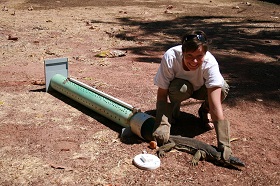Deakin research prompts scientists to investigate evolution’s role in cancer
Media releaseDeakin University scientists are eager to investigate if evolution can determine cancer development and even fight the disease, in the wake of exciting new findings that show evolution follows predictable pathways.
The scientists believe their research showing a mutant gene in goannas caused some to fall victim to cane toad toxins while others suffered no ill effects, could translate across the animal kingdom and through diseases, including humans and cancer.
Researcher Dr Beata Ujvari, from Deakin University’s Centre for Integrative Ecology, within the School of Life and Environmental Sciences, said the research showed predictable evolution could be more common than previously thought.
“It makes sense that evolution would therefore play a role in the development of other genes responsible for pathogen and disease resistance, including cancer development and progression,” Dr Ujvari said.
During their recent study the researchers investigated the genetic makeup of goannas from Asia, Africa and Australia, specifically to find out why some fell victim to toxins produced by toads, while others were resistant.
The research, which is published this week in the prestigious journal, Proceedings of the National Academy of Sciences of the United States of America, found all goannas had almost identical genes, but those resistant to the toxins had two small genetic mutations.
“Australian goannas, which do not have the mutation, die when they feed on introduced toads, while African and Asian goannas often ate the toads without suffering any ill effects of the toad toxin,” Dr Ujvari said.
Cane toads were introduced to Queensland in 1935 and have since spread over most tropical Australia causing massive mortality of not only goannas but also other predators such as the northern quoll.
“Our study fundamentally changes how we think about evolution, and how genetic mutations occur,” Dr Ujvari said.
“Deterministic evolution is potentially much more common than we have previously thought. Therefore, apart from toxin resistance, our study has much broader implications for ecology, conservation biology, evolution and medicine too.”
Co-researcher Professor Thomas Madsen, also from Deakin’s Centre for Integrative Ecology, said that most biologists were aware that evolution followed a more or less random pattern.
“Our study is one of the first to show that evolution can follow highly predictable paths,” Professor Madsen said.
“So, for example, if animals have adapted to certain climatic conditions via predictable evolution, they have then been locked into a specific evolutionary path and will be unable to adapt to changing environmental conditions, such as rising temperatures.”
“We are eager to now broaden our investigation and study whether deterministic evolution affects genes involved in pathogen resistance, growth rate and cancer.”
The research was led by Deakin University and included researchers from the University of Sydney, the University of Canberra, the University of Queensland, the University of Wollongong, the University of Liverpool, and the Hebrew University of Jerusalem.
It was funded by the Ian Potter Foundation and the Whitehead Bequest (Conservation), Faculty of Veterinary Science, University of Sydney.
Share this story
 Goanna do more research on this: Deakin researcher Dr Beata Ujvari is excited by new findings that show evolution could play a role in cancer development
Goanna do more research on this: Deakin researcher Dr Beata Ujvari is excited by new findings that show evolution could play a role in cancer development
